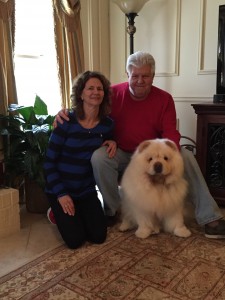Bristol is a beautiful 4.5 year old, neutered, male Chow Chow. He is stunning in his photos. However, more significant than his appearance, were when his owners, Sid and Judi, were stunned by Bristol’s apparently sudden aggressive behavior.
Sid and Judi owned Bristol since he was a puppy. Historically, Bristol has been non-aggressive with Sid and Judi, although he was at times stubborn. More noteworthy, he has been highly affable with guests- much more convivial than the average Chow. Therefore, Sid and Judi were surprised when Bristol recently snapped at people who tried to pet him. Sid and Judi were even more shocked when Bristol bit Sid when he asked Bristol to release a piece of pizza that Bristol took from the garbage and when Bristol again bit Sid when Sid tried to remove him from the bed. Bristol also recently began growling at Judi when she tried prompting him to enter the car or when she approached his food bowl.
The preceding data, combined with the fact that Bristol no longer could physically jump into the back seat of Judi’s sedan, led CPT to believe that the primary origin of Bristol’s undesirable behavioral metamorphosis was pain-induced aggression, not dominance aggression, as was initially believed by the owners. Per CPT’s recommendation, Sid and Judi took Bristol to their veterinarian, who confirmed a diagnosis of elbow dysplasia and concomitant inflammation. The veterinarian prescribed an NSAID to relieve the inflammation and temporarily prescribed tramadol, an opioid analgesic.
Within a few days Bristol appeared physically and emotionally more relaxed. He also quickly became more tolerant and less irritable when Sid or Judi communicated a command that would have formerly displeased Bristol.
Nevertheless, a concern remained about conditioned imprints that arose from Bristol’s elbow pain. Such imprints may result in the future development of fear aggressive behavior within the contexts of the bed, the car, an owner command, or the release of possessions. In addition, we wished to preventively address the possibility of secondary dominance, territorial, or possessive aggression. Consequently, we conducted behavior modification training.
The behavior modification plan consisted of counterconditioning and desensitization drills, facility modifications, and management protocols. Of the three facets of the plan, the facility modifications were the easiest to implement. To prevent recurrence of the bed behavior, Sid and Judi purchased a new mattress that had significantly greater height than the former mattress. Since Bristol could no longer jump onto the bed, due to the increased height, territorial or pain-induced aggression related to the bed was no longer relevant. Similarly, CPT advised Sid and Judi to purchase a trash can with a heavy lid or an electronic kitchen trash can that prevented Bristol from accessing the garbage. CPT also advised Sid and Judi to purchase a folding, portable ramp to help Bristol into the car.

The management protocols consisted of: 1) petting Bristol about the chin first, rather than immediately atop the head, and only when he appeared desirous of affection, 2) never grabbing or lifting Bristol from his forelegs, which was the catalyst for the time that Bristol bit Sid on the bed, 3) avoiding his food bowl when he is eating, 4) making sure that garbage is secure and human food inaccessible, and 5) practicing obedience drills like Sit and Come, where Bristol receives positive reinforcement for complying with commands.
The counterconditioning and systematic desensitization drills consisted of a drill for approach, a drill to prompt Bristol to leave his food bowl on command or leave the garbage can on command, and another drill to teach Bristol to release objects on the command “Drop.” The drills employed a clicker and the CPT Unequal Trade Protocol. All the drills were highly successful.
Prior to contacting CPT at the behest of a veterinarian friend at Pharr Road Animal Hospital, Sid and Judi were becoming frightened of Bristol and were uncertain whether they could safely keep him in the household. Now, after consulting with CPT, Sid and Judi better understand Bristol, better understand the origin of his behavior and why his behavior had an apparently sudden onset, and strongly believe that Bristol can remain a loved member of their household for the rest of his life.
CPT strongly believes that our behavior modification diagnostics and behavior modification protocols are superior to those available from other pet training and behavior modification companies in the Atlanta area. CPT Head Trainers are highly educated, experienced, and accomplished and are well-versed in a cornucopia of diverse training methodologies.
Few, if any trainers, in Atlanta have staff with comparable education, experience, or accomplishments, nonetheless all three. Similarly, in a time when a majority of trainers are philosophically affixed to a single training or behavior modification methodology, it is rare to find trainers or behaviorists that exhibit CPT’s array of knowledge and familiarity with a diverse collection of training methodologies. Moreover, after training over 50,000 animals, CPT has yet to meet a single method that is universally best for all dogs or even best for any individual dog throughout all exercises or stages of training. Therefore, a CPT Head Trainer or behaviorist with diverse knowledge is most likely to diagnose and construct a behavior modification plan that accomplishes your training goals.
If you or your dog would benefit from a CPT behavior modification program, please contact CPT by email (MarkCPT@aol.com) or by phone (404-236-2150).
(Marietta, GA)